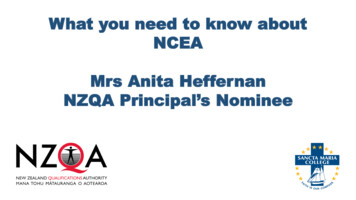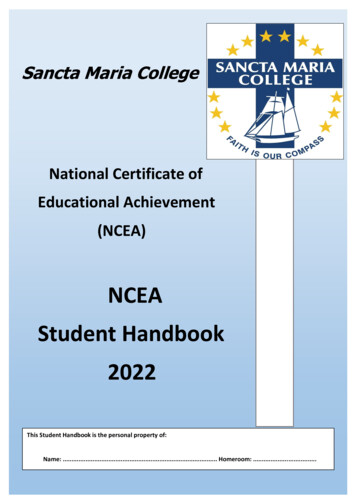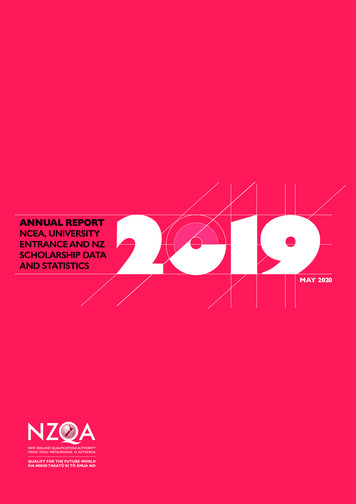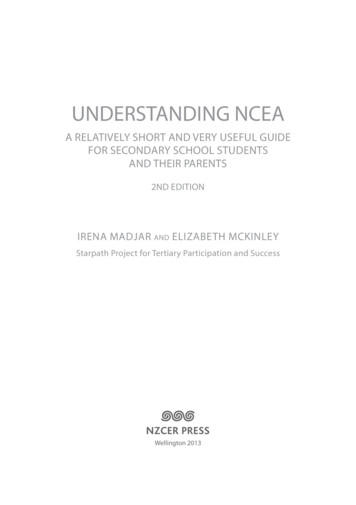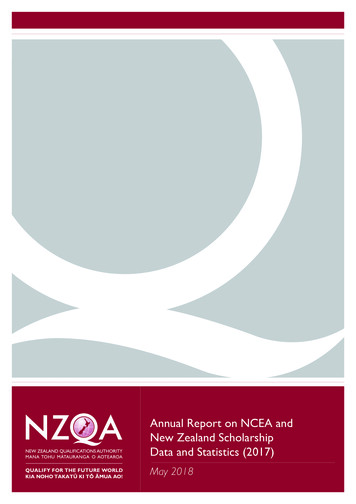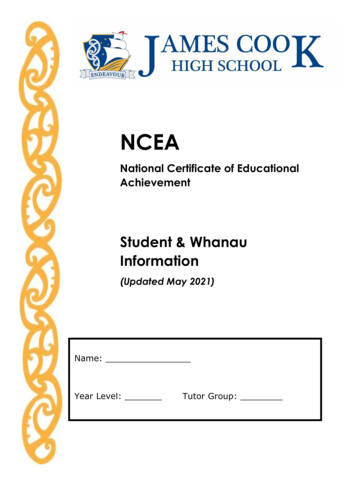
Transcription
NCEANational Certificate of EducationalAchievementStudent & WhanauInformation(Updated May 2021)Name:Year Level:Tutor Group:
Table of ContentsPage3Your NCEA Information Booklet-Introduction4Key Contact People at School5The National Certificate of Educational Achievement (NCEA)-EvidenceLevel 1, 2, 3Course Endorsement (p.5)Certificate Endorsement (p.6)7New Zealand Scholarship9Entrance to New Zealand Universities-10How to track my NCEA Progress-11Course OutlinesSpecial Assessment ConditionsAssessment results timelineFurther assessment opportunityResubmissions – Big change for 2021Quality AssuranceWhat is I am not happy with my marks?-15NZQA Log inParental PortalSchool results Record (SRR)What can I expect from my teacher?-13How to Achieve UENCEA results released to Universities & Technical InstitutesAppeals ProcedureAuthenticityPlagiarismMissed Deadlines and AssessmentsYour External Exam informationDerived Grade / Missed ExternalExternal examination information (before / during / after)2 Page17NCEA Results20Appeals Form
Your NCEA Information BookletIntroductionThis book is for you and you caregivers to read so that everyone understands what is required ofyou throughout your senior years regardless of which level of NCEA you are working towards.It contains: Information for you about the National Certificates Things you are responsible for Things to help youThe table of contents will help you to find information.NCEA is New Zealand’s national secondary school qualification and provides students with pathwaysto tertiary education and workplace training.This year you will be gaining qualifications through standards at NCEA Level 1, 2 or 3 in all subjects.You may also work towards Vocational Pathways qualifications.Note: An NCEA qualification does not need to be completed in a one-year timeframe or single levelstudies for you to be successful. You can take multi – level standards in your course and it can takeup to or beyond a year to get your qualification.This booklet contains guidelines that will help you to achieve success this year.During the year, your teachers will be collecting evidence that shows that you have achieved thestandards so it is important that systems for assessment are consistent and fair.It is also important that you are aware of your rights and responsibilities for assessment.The guidelines in this booklet apply to all the internal assessments (e.g. practical activities, tests,assignments, performances) that provide evidence that you have reached the standards. They alsoapply to practice exams and to work that you complete for other external assessments likeportfolios.All student data and work is covered by the Privacy Act. No data or work completed by any student,will be shown to other students without the express permission of the student concerned.If there are any changes to the information or the procedures used at JCHS, these will be passed on.Keeping Assessment Information SafeYou will need to refer to this NCEA Information Booklet over the next year. It is important that youfile it and any subject information about assessment, in a safe place.In case assessments are lost make copies of assessments before you hand them in. Be sure to saveall computer generated assessments.3 Page
Key Contacts at SchoolStudents and their parents or caregivers are welcome to contact the following people at any timeif they wish to discuss issues with respect to academic progress.Year 11:Deans:Deputy Principal:Year 12 / 13:Deans:Deputy Principal:Mrs Tu’u BellMr Adiel Adamst.bell@jchs.school.nza.adams@jchs.school.nzMs Maria Coynem.coyne@jchs.school.nzMiss Fane KetuuMrs Romilla ol.nzMs Marlene Andersonm.anderson@jchs.school.nzNZQA Liaison person: Mr Stuart King(Principal’s Nominee)Deputy Principal responsible for NCEA:Also here to help: Your Subject teachers The Head of Faculties Your Tutor Group Teacher4 Pages.king@jchs.school.nzMs Maria Coynem.coyne@jchs.school.nz
The National Certificate of EducationalAchievement (NCEA)Evidence CollectedThis year, your teachers will gather evidence that shows you have gained Achievement or Unitstandards. Evidence about your achievement may be collected in a variety of ways, for example,group tasks, assignments, speeches, tests, projects, performances, examinations.Some standards may be assessed during the year (internally assessed) and others throughexaminations held at the end of the year (externally assessed) or by submissions of portfolios inVisual Art and Graphics or through cultural group performances.Achievement Standard OutcomesAchieved AAchieved with Merit MAchieved with Excellence ENot Achieved NUnit Standards (with some exceptions)Achieved ANot Achieved NLevel 1 NCEA80 credits minimum at NCEA Level 1 or higher. Must include 10 literacy credits (English or Te ReoMaori) and 10 numeracy credits (Mathematics, Pangarau). The subject course outlines will tell youwhich standards offer Level 1 literacy or numeracy credits.NCEA Level 1 Endorsement with MeritNCEA Level 1 Endorsement with Excellence 50 credits at Excellence or Merit 50 credits at ExcellenceLevel 2 NCEA80 credits, of which 20 can come from NCEA Level 1, and a minimum of 60 at NCEA Level 2 orhigher.NCEA Level 2 Endorsement with MeritNCEA Level 2 Endorsement with Excellence 50 credits at Excellence or Merit 50 credits at ExcellenceLevel 3 NCEA80 credits, of which 20 can come from NCEA Level 2, and a minimum of 60 at Level 3 or higher.NCEA Level 3 Endorsement with MeritNCEA Level 3 Endorsement with Excellence 50 credits at Excellence or Merit 50 credits at ExcellenceCourse Endorsement:Each subject a student takes may be available for a course endorsement. This recognises highquality results across the majority of standards in that particular subject. You can get a subjectendorsed with Merit or endorsed with Excellence.To get an endorsed certificate the course must be structured in such a way that at least 3 of the14 credits must be from internally assessed standards, and 3 from external assessment (national5 Page
examinations). This is to demonstrate students are competent in both forms of assessment.Subjects which are exceptions to this rule are Physical Education, Religious Studies, Visual Arts andDance.To gain a subject endorsement you need at least 14 credits or above at Merit or Excellence.A course endorsement is not a qualification.A course endorsement can be awarded even if a qualification for that level is not achieved. Foeexample, a student may achieve a Merit endorsement for their Level 2 Mathematics courseregardless of whether they achieve NCEA Level 2.Certificate Endorsement:For an NCEA certificate to be endorsed with Excellence a student must gain 50 credits atExcellence at the level of the certificate or above. So, if a student has 50 Level 1 credits atExcellence they may have their Level 1 certificate endorsed with Excellence. Likewise, if a studentgains 50 credits at Merit (or Merit and Excellence) at Level 1 their NCEA Level 1 certificate may beendorsed with Merit.Endorsement awards show on the Record of achievement.Certificate endorsement is calculated in January each year on the release of external results. Onlythe highest level certificate awarded can be endorsed unless students: Achieve more than one level NCEA certificate in a single year eg: a Year 11 student doingmulti-level study may achieve both a Level 1 and a Level 2 certificate in the one yar andhave them endorsed.in addition to meeting the requirements of a higher level certificate endorsement theyhave achieved sufficient credits from a lower level to be able to endorse the lower levelcertificate e.g. a student may be working at both Levels 2 and 3 and achieve enough Level 2Excellence credits to upgrade their Level 2 Merit endorsement to Excellence. The studentwill need to contact NZQA to have the lower level certificate upgraded.6 Page
New Zealand ScholarshipNew Zealand Scholarship assessments enable candidates to be assessed against challengingstandards and are demanding for the most able candidates in each subject. Assessment is byeither a written/spoken examination or by the submission of a portfolio or report of workproduced throughout the year.Scholarship candidates are expected to demonstrate high-level critical thinking, abstraction andgeneralisation, and to integrate, synthesise and apply knowledge, skills, understanding, and ideasto complex situations.Entry to New Zealand ScholarshipStudents can enter for New Zealand Scholarship if they are enrolled in a consented New Zealandsecondary school. This means entry is open to: secondary school students who hold New Zealand residency international fee-paying students enrolled with a consented New Zealand secondaryschool; or students enrolled in a non-consented school which has a Memorandum ofUnderstanding with one which is consented; or home-schooled, secondary school equivalent students, who make an entry as a linkstudent with a consented school and attest to their eligibility through a Justice of thePeace.Eligibility to receive a monetary awardTo be eligible to receive a scholarship award, the student must be enrolled in tertiary study in NewZealand for the years in which they receive monetary awards. For awards with second orsubsequent year payments, recipients must maintain a 'B' grade average each year of their tertiarystudy in New Zealand.How many candidates are awarded New Zealand Scholarship?Approximately 3 percent of all students studying each subject at Level 3, who achieve 14 or morecredits in the subject, are awarded Scholarship if they reach the standard that has been set.How is New Zealand Scholarship marked?Markers allocate a score of 0-8 for each component in the New Zealand Scholarship assessmentusing subject specific schedules. These are based on a Generic Marking Guide, as follows: An answer given a score of 8 is an Outstanding answer in all respects. Strong evidenceof integration and synthesis. As good as could be expected under examinationconditions. Accurate, comprehensive, coherent, lucid, perceptive.A score of 1 shows Meagre understanding relevant to the question. A score of 0 is awarded for answers that are blank or irrelevant.7 Page
The work of the highest-scoring candidates is reviewed by marking panels, to identify the topcandidates in each subject. Exam booklets for candidates whose scores are close to either theScholarship or Outstanding cut-offs are also re-marked, to ensure their results are correct.New Zealand Scholarship assessments have between 3 and 5 components, and the scores for eachcomponent are totalled to give the final result.Student exemplarsA selection of examination papers have been reproduced with permission from previous TopScholars. To view these examination papers, go to the New Zealand Scholarship subjects page andclick on the 'assessment specification and resources' link for each subject. The Top Scholarexamination booklet is at the bottom of the page under the [subject] resources heading.New Zealand Scholarship resultsNew Zealand Scholarship results are released about mid-February each year.For further details about New Zealand Scholarship, refer to www.nzqa.govt.nz.8 Page
Entrance to New Zealand UniversitiesUniversity Entrance is the minimum requirement to enter a New Zealand University Degreecourse.To achieve University Entrance you need Level 3 NCEAA minimum of 14 credits at NCEA Level 3 or higher, in each of three subjects from theApproved Subjects for University Entrance (UE).Go to: wards/universityentrance/approved-subjectsAs well as: A minimum of 10 credits at NCEA Level 1 or higher in numeracy. A minimum of 10 credits at NCEA Level 2, or higher, in English or Te Reo Maori: 5 credits must be in Reading 5 credits must be in Writing The literacy credits will be gained from a list of approved AchievementStandards and Unit Standards.Level 3 orhigherAchieve NCEA Level 314 credits inan approvedsubject14 credits inan approvedsubject14 credits inan approvedsubjectLevel 3 orhigherThey must be5 credits inReading5 credits inWriting10 Numeracy Credits10 literacycreditsLevel 2 orhigherLevel 1 orhigherOnce you have met the requirements for University Entrance it will appear on your Record ofAchievement.PLEASE NOTE that many universities have extra entry requirements.See the Careers Advisor for regular updates.NCEA Results released to Universities and Technical InstitutesIn January, NZQA will send all NCEA Level 2, Level 3 and University Entrance results that have beenauthorised for release to all New Zealand Universities and some Polytechnics. This helps theseplaces process enrolments quickly.9 Page
How to Track my NCEA progressAll students have a National Student Number (NSN). You can find out yours by asking your TutorTeacher and / or Dean. Later in the year, NZQA will send you, through the school, your own NSNcard to confirm your contact details and address. Keep this card, or take a photo of your NSNnumber.Registering for Learner Login on the NZQA WebsiteOnce you have received your NSN number you will be able to register on the NZQA website(www.nzqa.govt.nz) as a student.This website also provides: Student Exam Hub Access for Digital Exams Information for Maori and Pasifika Parent information about NCEA Record of your NCEA achievement NCEA External Examination timetable External Examination Entry Slip Access to change your personal postal details and much, much more.Parents & Caregivers:Do you want to check up on your child’s NCEA progress?If the answer is YES – then use the online parent portalat www.jchs.school.nzAt the bottom of the page find: PARENT PORTALClick on Parent Portal.The tutor teacher will give you the User Name & your login.Remember to keep this login to yourself. You may prefer not to write it here due to privacy.School Results RecordThe school keeps a record of all the results a student attempts while at school and has a summaryof credits by course and by level. For an update of credits or qualifications any teacher can checkthe school system for you. The staff in the Careers room are available during intervals and lunchbreaks to help you understand your results better and your tutor, teachers, Deans and DeputyPrincipals can help also.10 P a g e
What can I expect from the teachers?Course OutlinesYou will receive a course outline at the start of the year for every NCEAsubject you take. Putting them all together will help you plan for the yearand give you a big picture view of where you will get your NCEA creditsfrom.The course outlines will include important information about your coursesuch as:- Course outline of what topics you will cover during the year- Standard numbers, title, version numbers and credits for each standard- Information about internal and external assessments- Approximate dates for assessment or when work is due in- Indication of whether further assessment opportunities are offered and when- Standards that count towards numeracy & literacy requirements for Level 1 NCEA & forUniversity Entrance.Special Assessment Conditions (SAC)Our Special Educational Needs Coordinator (SENCO) ensures that students who require SpecialAssessment Conditions have these available. As a result of a Special Assessment Condition beingapplied for, and subject to approval, a student may be provided with special assistance. If youbelieve you may qualify for Special Assessment Conditions please contact our SENCO.Special Assessment Conditions - Process: Students are evaluated for reader/writer/extra provision by the Learning Support following specificcriteria by NZQA. Our school applies to NZQA each year on behalf of students for SAC for internal and externalassessments. An appeal can be lodged with NZQA if a SAC is approved. Students must be assessed within three years by a registered educational psychologist to retaineligibility (usually Year 10 will carry them through to Year 13). Normally such students have been identified at entry by Learning Support; however, arecommendation for consideration for SAC can be presented at any time by a student,parent/caregiver or teacher. This can be done through our SENCO or directly to the Learning SupportCentre.Students eligible to access extra support may have: A manifest physical (motor, visual or other sensory) disability. A writing disability (processing difficulty including fine motor or perceptual problems which makewriting slower or less legible). A significant learning difficulty such as a severe reading delay. A list of students eligible for SAC is circulated to teachers and SAC will be available to them forassessments and College examinations throughout the year. Note that SAC is available only for conditions resulting from long term disabilities.Conditions resulting from a recent accident e.g. broken arm, which would call for Derived Gradeapplications in the external NZQA exams.11 P a g e
Assessment results timelineTeachers will endeavour to have student work marked within two weeks of final submission butthis might not be possible in all cases. They might need to give you a provisional result because themarking needs to be checked before the result can become official. Students who are concernedabout the length of time their results are taking should talk with the teacher or the Head ofLearning Area. Any student may refer to the Head of each subject Learning Area if there arefurther concerns. Tutors, Deans and DPs may be consulted if necessary.Further Assessment OpportunitiesA maximum of one further opportunity for assessment of a standard can be provided within ayear. A further assessment opportunity occurs when a new assessment is provided. It is theschool’s decision whether a further opportunity will be offered for any standard. If a furtheropportunity for assessment is offered, it must be made available to all students entered for thatstandard, regardless of their result on the first opportunity, after further teaching.Students must be awarded the highest grade they have achieved over both opportunities.ResubmissionChange to resubmission rules from 2021 onwardsThis change is an outcome of the NCEA Review.Our school may offer a resubmission opportunity to you only when a minor error prevents youfrom reaching an ‘Achieved’ grade.The only change in grade boundary available for resubmissions is from ‘Not Achieved’ to‘Achieved.’On this basis, the highest grade that you can be awarded as a result of a resubmission of aninternal assessment is limited to ‘Achieved’.Schools may continue to offer one resubmission for each assessment event against anAssessment Standard.Quality AssuranceTo ensure that grade decisions are consistent with those at other schools a system of moderationis set up. This means that your teachers critique materials before use to make sure they aresuitable and offer a fair opportunity to gain all possible grades, verify a sample of assessments andall standards are checked by another teacher before results go up officially onto the schoolsystem. Sometimes throughout the year teachers from other schools will moderate the work.National moderators also check samples of student work during the year.12 P a g e
What if I am not happy with my marks?AppealsStudents may appeal the grade awarded for an internal assessment, within FIVE school days ofreceiving your grade.The appeals pathway is: Refer concern to your subject teacher firstly If still concerned, refer to the Head of Faculty (HoF) Complete an official appeal to our Principal’s Nominee (see Appendix A – appeal form)If an appeal results in any change to the application of the judgment criteria for the standard, thechange will be applied to all student work.Students may also use the procedure below to appeal a ruling on a breach of authenticity orassessment rules.Appeals Procedure1. Students should check that they agree with the grade given. You can ask the teacher toreconsider.2. If you are unhappy with the teacher’s explanation, you may ask the Head of Learning Area(HOLA) for a re-mark, using an Appeals form. This must be done within five school days ofthe work being handed back from the teacher to the students. The form is available fromthe Head of Learning Area.3. If you still disagree you may appeal to the Deputy Principal or your year level.What are my responsibilities?AuthenticityAll work submitted must be your own.It is your responsibility to:- Keep all drafts and working documents and hand them in to your teacher if required.- Keep a record of all resources that were used including books, websites, handwritten plans.- Acknowledge the source of all material in your assignment saying where it was obtained.- Ensure your data is accurate.- Be prepared to discuss your work further with your teacher if required.- Meet milestonesPlagiarism / Breaches of Assessment RulesYou must not:- Copy another student’s work.- Quote material from written or electronic sources without acknowledging the source(plagiarism)- Inappropriately help another student with any part of their work.- Allow someone else to copy your work.- Allow someone else to do your work.13 P a g e
-Use forbidden technology in a test or exam (e.g. Cellphone, non-standard calculator, smartwatches)This is the process that is followed when the authenticity of your work is an issue: The subject teacher marking the assessment will inform the HOF if there is an authenticity issue withyour assessment. The HOF will interview you about the authenticity of your assessment after gathering the relevantevidence. The HOF will give all the evidence to the Principal’s Nominee who will then interview you and make afinal decision. You, your parents/caregivers, may be called in to meet with the Principal’s Nominee Your subject teacher, HOF and Dean will be informed of the decisionA Not Achieved result will be entered.Missed Deadlines and AssessmentsIt is your responsibility to hand in assessments at the time set by the subject teacher. If you areaware of any valid reason why a deadline might be missed this must be discussed with theteacher. A valid reason might be: a school trip or performance, an unexpected illness, a familyemergency or trauma, several assessments being due at the same time. Keep the teacherinformed and make suitable arrangements which might include an agreed extension of time tohand in the work. If work is still not submitted after discussion with the teacher, a Not Achievedresult will be recorded.External ExaminationsWhat happens if I am entered for an external exam but miss it?What happens if I have a good reason for not doing so well on the day?It is possible to apply for a derived grade if students miss external assessments in November orexternally assessed standards such as those with portfolios. Significant conditions or events in themonth before the start of the examination time that interfere with preparation for theexamination might be accepted, as well as temporary illness or trauma occurring during the actualexamination period.Candidates suffering a temporary illness, trauma or other serious event should be encouraged tosit the examination and apply for a derived grade if they consider their performance was affected.If the application is approved, the best result will be awarded.How to apply: See your Principal’s Nominee as soon as possible after the examination is missed tofill out the appropriate form. You may need to get a doctor or another professional to fill out partof the form to verify illness or difficult circumstances. The subject teacher must be able to providean authentic grade based on preliminary examination results and work completed during the year.14 P a g e
Your External examination informationBy entering in external assessment, including exams, you agree to follow the rules as outlined inInstructions and Information for Candidates provided to you in term 4; and to comply with thedecisions of NZQA. These rules ensure assessment conditions for all students are fair and allowthem to present original work.Students must not break the rules in any way. NZQA will investigate any possible breach of therules and may withhold results where the breach is proven.Before an examExam timetableThe NCEA and New Zealand Scholarship examination sessions are three hours. The exam sessionsstart at either 9.30 am or 2.00 pm. To find out the date and time of an exam, see your Examtimetable (a published copy can also be found at www.nzqa.govt.nz.Exam materialsYou are responsible for taking the correct equipment to the exam and making sure that it isworking.Bring equipment into the exam room in a clear plastic bag. You can bring: pens (black and blue colours are permitted) pencils and an eraser an approved calculator for subjects where a calculator has been used during the year.Calculators must be silent, hand-held, non-printing and work from their own power. You cannotkeep notes, routines or store files in the calculator memory. Teachers or supervisors will check thecalculator memory is cleared before it can be brought into the exam room. There is a listof Approved calculators.Emergency evacuation and student packYou are allowed to bring items for an emergency evacuation into the examination room in a clear,sealable plastic bag. This pack must stay under the chair and not be touched or opened withoutthe permission of the supervisor. Contents could include a mobile phone (switched off) or otherelectronic device, keys, money, bus pass and medicines.Banned itemsDo not bring the following items into an exam room unless sealed in the emergency evacuationpack: blank paper or refill paper correcting fluid books, written notes or electronic notes cell phones or pagers English dictionaries, foreign language dictionaries, or te reo Māori dictionaries ortranslators watches of any type (digital or analogue)15 P a g e
any electronic device which has the capability to store, communicate and/or retrieveinformation except approved calculators.On the day of the examArrive at least 20 minutes before the exam starts to find out the location of the exam roomarranged by the school.If you arrive more than 30 minutes after the exam has started, you will not be able to sit the examor enter an exam room.In the exam room At all times, listen to and follow the instructions of the supervisor.Sit at the desk allocated. The exam booklets at this desk will have been selected andcoded specifically for the individual student.Check all the answer booklets have your student NSN and Examination Code on themas listed on your Admission Slip.When told, check that all pages in each exam booklet are printed correctly.If you have a problem, you should put your hand up.You cannot leave in the first 45 minutes or the last 15 minutes of the examination,even to use the toilet.During the examYou should: not borrow equipment from someone elsenot talk to, communicate with, or do anything to disturb other studentsnot read or copy another student's work.Writing answersYou should: follow all the instructions on the front cover of the exam booklet use only black or blue pen not write in pencil unless instructed to do so. Work in pencil or erasable pen will not beaccepted if a student applies for review or reconsideration write neatly, so the marker can read the answers cross out any work you do not want marked not write or draw anything that may be regarded as offensive not write to the marker or write in the part of the answer booklet 'For assessor's use only' not write answers for one standard in the answer booklet for another. Where you fill upyour answer booklet, you may request extra paper fill in your details at the top of any additional sheets of paper provided and put them insidethe answer booklet.At the end of the examYou must stop writing when the supervisor tells you to. You must hand all material to be markedto the supervisor before you leave. If you take any work outside the examination room, it will notbe marked.You can keep resource booklets and separate question booklets.16 P a g e
NCEA ResultsSecondary school students will receive results for all internal or external standards that areassessed as part of NCEA.During the school year, you will receive results for internally assessed work. These results are sentby the school to NZQA throughout the year.At any stage, you can log in via the Student login and view the results that NZQA holds for you.External assessment resultsYou can access results of your externally assessed standards in January, through your StudentLogin.You have the right to request: a review, if a processing error has occurred or a reconsideration, if they believe an error in marking has occurred.The application forms for reviews and reconsiderations will not be available until after papers havebeen returned to candidates.17 P a g e
School Results Summary (SRS)A SRS is an unofficial transcript of all results a student has gained for both internally and externallyassessed standards while at senior secondary school, including those not achieved. It also lists anynational qualifications, endorsements and awards gained while at school, and has a summary ofcredits by course and level.You can print a copy of your SRS yourself, anytime, by: Logging in to the NZQA Student login Clicking on the pdf icon in the "My School Entries and Results" screen Printing the School Results Summary pdf.For an official transcript of results, you will need to order your Record of Achievement (ROA).Record of Achievement (ROA)A Record of Achievement is an official transcript of all the national qualifications and standardsthat you have ever achieved. Any qualifications gained before the implementation of the NationalQualifications Framework will not appear on the ROA.The New Zealand Record of Achievement in hard copy format
The National Certificate of Educational Achievement (NCEA) Evidence Collected This year, your teachers will gather evidence that shows you have gained Achievement or Unit . Scholarship candidates are expected to demonstrate high-level critical thinking, abstraction and generalisation, and to integrate, synthesise and apply knowledge, skills .
